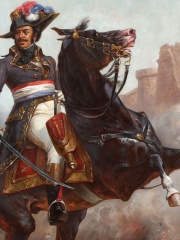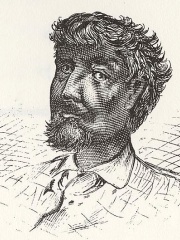

The Most Famous
MILITARY PERSONNELS from Haiti
This page contains a list of the greatest Haitian Military Personnels. The pantheon dataset contains 2,058 Military Personnels, 2 of which were born in Haiti. This makes Haiti the birth place of the 75th most number of Military Personnels behind Chile, and Ethiopia.
Top 2
The following people are considered by Pantheon to be the most legendary Haitian Military Personnels of all time. This list of famous Haitian Military Personnels is sorted by HPI (Historical Popularity Index), a metric that aggregates information on a biography's online popularity.

1. Thomas-Alexandre Dumas (1762 - 1806)
With an HPI of 68.68, Thomas-Alexandre Dumas is the most famous Haitian Military Personnel. His biography has been translated into 26 different languages on wikipedia.
Army-General Thomas-Alexandre Dumas Davy de la Pailleterie (French: [tɔmɑ alɛksɑ̃dʁ dymɑ davi də la pajət(ə)ʁi]; 25 March 1762 – 26 February 1806) was a French Army officer who served in the French Revolutionary Wars. Along with fellow French officers Joseph Serrant and Toussaint Louverture, Abram Petrovich Gannibal from Imperial Russia and Władysław Franciszek Jabłonowski from Poland, Thomas-Alexandre Dumas was noted as a man of African descent (in Dumas's case, through his mother) leading European troops as a general officer. All four commanded as officers in the French Army and apart from Gannibal, who was only captain and engineer-sapper in the Army of Louis XV during his formative years, they all gained their general ranks in the French Army, about four decades after Gannibal had done the same in Russia. Yet Dumas was the first person of color in the French military to become brigadier general, divisional general, and general-in-chief of a French army. Born in Saint-Domingue, Thomas-Alexandre was the son of Marquis Alexandre Antoine Davy de la Pailleterie, a French nobleman, and of Marie-Cessette Dumas, an enslaved woman of African descent. He was born into slavery because of his mother's status, but his father took him to France in 1776 and had him educated. Slavery had been illegal in metropolitan France since 1315 and thus any slave would be freed de facto by being in France. His father helped him enter the French military. Dumas played a large role in the French Revolutionary Wars. Having entered the military in 1786 at age 24 as a private, by age 31 he commanded 53,000 troops as the General-in-Chief of the French Army of the Alps. Dumas's victory in opening the high Alpine passes in 1794 enabled the French to initiate their Second Italian Campaign against the Austrian Empire. During the battles in Italy, Austrian troops nicknamed Dumas the Schwarzer Teufel ("Black Devil", Diable Noir in French) in 1797. The French—notably Napoleon—nicknamed him "the Horatius Cocles of the Tyrol" (after a hero who had saved ancient Rome) for defeating a squadron of enemy troops at a bridge over the Eisack River in Clausen (today Klausen, or Chiusa, Italy) in March 1797. Dumas participated in the French attempt to conquer Egypt and the Levant during the Expédition d’Égypte of 1798–1801 when he was a commander of the French cavalry forces. On the march from Alexandria to Cairo, he clashed verbally with the Expedition's supreme commander Napoleon Bonaparte, under whom he had served in the Italian campaigns. In March 1799, Dumas left Egypt on an unsound vessel, which was forced to run aground in the southern Italian Kingdom of Naples, where he was taken prisoner and thrown into a dungeon. He languished there until the spring of 1801. Returning to France after his release, he and his wife had a son, Alexandre Dumas (1802–1870), who would become one of France's most widely-read authors. The son's most famous literary characters were inspired by his father.

2. Jean Baptiste Point du Sable (1745 - 1818)
With an HPI of 55.94, Jean Baptiste Point du Sable is the 2nd most famous Haitian Military Personnel. His biography has been translated into 24 different languages.
Jean Baptiste Point du Sable (French pronunciation: [ʒɑ̃ batist pwɛ̃ dy sɑbl]; also spelled Point de Sable, Point au Sable, Point Sable, Pointe DuSable, or Pointe du Sable; before 1750 – August 28, 1818) is regarded as the first permanent non-Native settler of what would later become Chicago, Illinois, and is recognized as the city's founder. The site where he settled near the mouth of the Chicago River around the 1780s is memorialized as a National Historic Landmark, now located in Pioneer Court. Point du Sable was of African descent, but little else is known of his life before the 1770s. During his career, the areas where he settled and traded around the Great Lakes and in the Illinois Country changed hands several times between France, Britain, Spain and the United States. Described as handsome and well-educated, Point du Sable married a Potawatomi Native American woman, Kitihawa, and they had two children. In 1779, during the American Revolutionary War, he was arrested by the British on suspicion of being an American Patriot sympathizer. In the early 1780s, he worked for the British lieutenant-governor of Michilimackinac on an estate at what is now St. Clair, Michigan. Point du Sable is first recorded as living at the mouth of the Chicago River in a trader's journal of early 1790. By then, he had established an extensive and prosperous trading settlement in what later became the City of Chicago. He sold his Chicago River property in 1800 and moved to the river port of St. Charles, where he was licensed to run a ferry across the Missouri River. Point du Sable's role in developing the Chicago River settlement was little recognized until the mid-20th century. In Chicago, a school, museum, harbor, park, bridge, and road have been named in du Sable's honor.
People
Pantheon has 2 people classified as Haitian military personnels born between 1745 and 1762. Of these 2, none of them are still alive today. The most famous deceased Haitian military personnels include Thomas-Alexandre Dumas, and Jean Baptiste Point du Sable.

